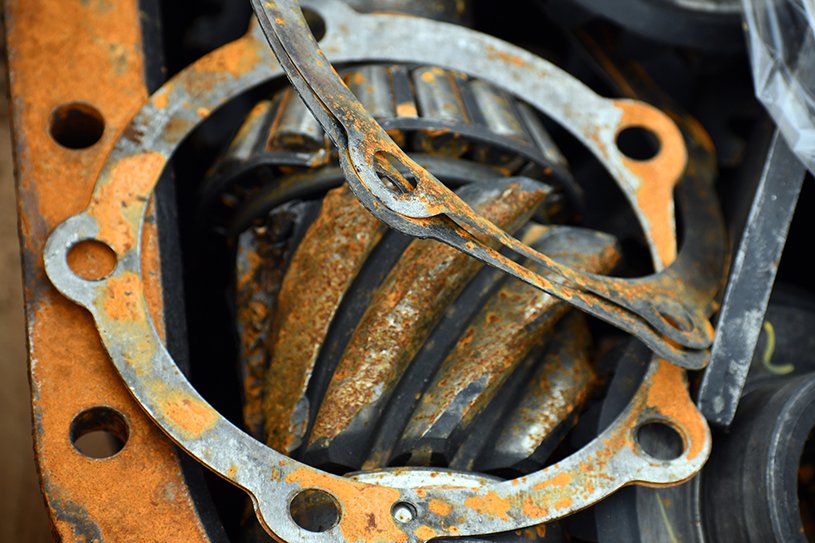Oxidation Testing and Corrosion Testing
Oxidation Testing
Oxidation is the primary way a lubricant degrades over time from normal use. As oil is used in a machine over time, the oxidation process occurs, typically starting with the degradation of antioxidant additives. Several ASTM methods may be used to determine or evaluate the oxidation stability of an oil, such RPVOT D2272, D943, D4310, FTIR D7414, D4742 the TFOUT, Thin-Film Oxygen Uptake Test and D942 oxidation stability for greases. In addition to these standard test methods, Savant Labs can combine customized Tannas Quantum® in-test sampling and FTIR or GC/MS to monitor the depletion of anti-oxidants in oil, providing powerful information on the life span of these lubricants.
Corrosion Testing
Corrosion Inhibitors are important components of finished lubricants that protect metal components from corrosion. The best way to stop corrosion is not to allow the metal to come in contact with water, oxygen, or acid. Several ASTM methods may be used to determine a lubricant’s ability to resist corrosion, including D665 Rust Prevention, D6594 High-Temperature Bench Corrosion Test, D1748 Exposure in a humidity cabinet, and D6557 Ball Rust, a GF-6 specification test. The Savant Technical Team can advise which test method is best for your application and situation.
For more information on how Savant Labs can assist with the challenges of oxidation stability and corrosion, contact us for your testing needs.
ASTM International Method
ASTM D525 Oxidation
Stability (Gasoline)
ASTM D665 Rust
Prevention 4 Hours (Method A or B)
ASTM D665 Rust Prevention 24 Hours (Method A or B)
ASTM D942 Oxidation
Stability (Grease) 100 Hours
ASTM D942 Mod.
Oxidation Stability (Grease) > 100 Hours
ASTM D943 Oxidation Characteristics (2.0 TAN or 1000
Hours)
ASTM D943 Oxidation
Characteristics (2.0 TAN or 2000 Hours)
ASTM D943 Oxidation Characteristics (2.0 TAN or 3000
Hours)
ASTM D1748 Rust
Protection by Humidity Cabinet
ASTM D2112 Oxidation
Stability of Inhibited Oil by Pressure Vessel at 140°C
ASTM D2272 Rotating
Bomb Oxidation Test (RBOT)
ASTM D2274 Oxidation Stability (Petroleum Fuel Oil)
ASTM D2893 Oxidation
Characteristics Extreme Pressure
ASTM D4310 Sludging
& Corrosion Tendency (Up to 1000 Hours)
ASTM D4742 Thin Film
Oxidation Uptake Test (TFOUT) Gas Engine Oils
ASTM D5483 Oxidation Stability of Greases by PDSC
ASTM D6186 Oxidation
Induction Time by PDSC
ASTM D6335 Thermo-oxidation
Engine Oil Simulation Test (TEOST® 33C)
ASTM D6557 Ball Rust
Test
ASTM D6594 High-Temperature Corrosion Bench Test at 135°C
ASTM D7097 Thermo-oxidation
Engine Oil Simulation Test (TEOST MHT®)
ASTM D7098 Thin-Film Oxygen Uptake Test (TFOUT) Catalyst
B
ASTM D7414 FTIR Analysis, In-Service Fluid, Oxidation
ASTM D7462 Oxidation
Stability (Biodiesel)
ASTM D7462 Oxidation
Stability (Biodiesel - B100 Option)
ASTM D8447 Thermo-oxidation Engine Oil Simulation Test (TEOST Turbo®)
ASTM E1858 Oxidation
Induction Time by PDSC
CEC L-48 Oxidation
Stability of Lubricating Oils by Artificial Aging
CEC L-105 Low-Temperature Pumpability
CEC L-109 Oxidation Test - In The Presence Of Biodiesel Fuel
EN 14112 Oxidation
Stability (Biodiesel & Petroleum Blends) Rancimat
EN 15751 Oxidation
Stability (Bio-based FAME Only) Rancimat
SAVLAB EV-CDT Conductive Deposit Test
SAVLAB EV-WCT Wire Corrosion Test

